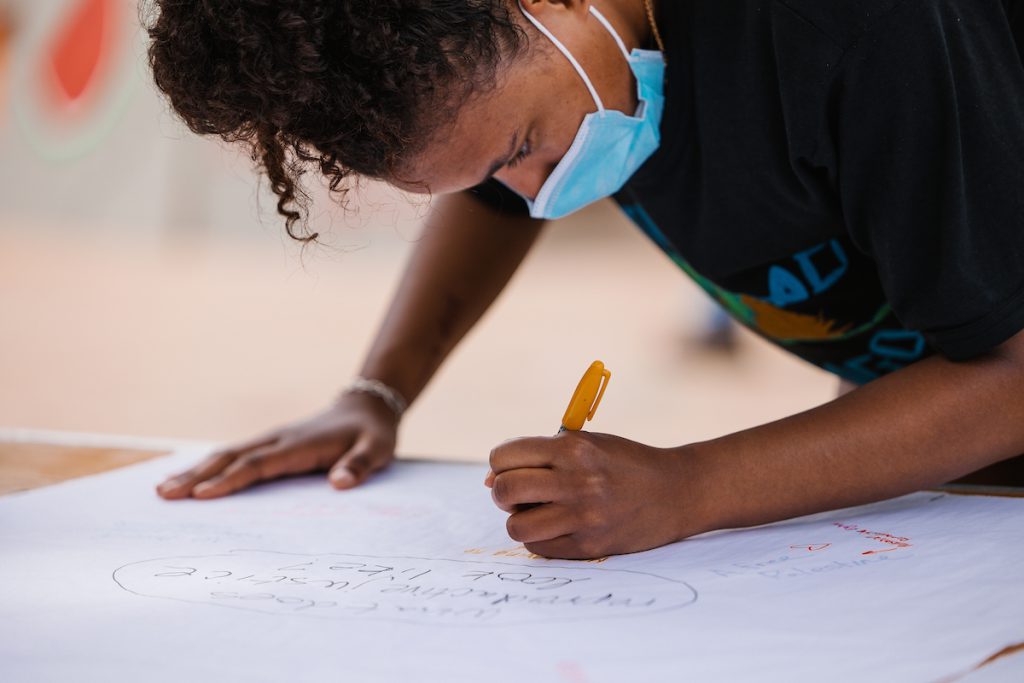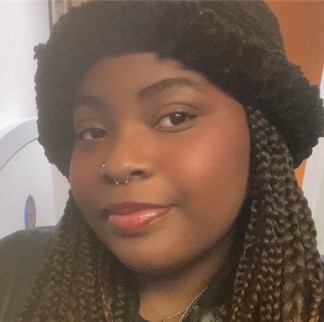
Why Major in Critical Ethnic Studies at K?
Who gets to write history and define truth, and what voices and world views are centered in the process?
As a critical ethnic studies [CES] student, you will question how knowledge is defined and the power structures that dictate “truth.” Disentangling the colonial and racial projects that govern the relationship between people and land, you will re-examine universal ideas through the perspective of marginalized groups and world views.
To understand these varied perspectives, the department takes an interdisciplinary approach to education, allowing you to fulfill major requirements through select classes in English, religion, anthropology and sociology, and political science—in addition to your CES-specific courses. You will invert, rethink, and displace traditional, colonial narratives in classes like The Colonial and Imperial Difference; World Indigenous Literatures: The People and the Land; Insurgency, Solidarity, and Coloniality of Power; and Body, Land, and Labor. By critically examining normalized narratives, you will gain a more complicated and holistic view of the human experience.
The critical thinking, communication, and research skills you will develop over your four years as a CES student will prepare you for a lifetime of advancing social justice, with alumni having had successful careers in community organizing, education, law, and business.
What can you do with a critical ethnic studies major?
Below are some of the careers, employers, and graduate schools of our CES alumni.
Careers
- Paralegal
- Diversity, Equity, and Inclusion
- Sustainability Program Manager
- Museum Studies
Employers
- Fulbright
- YWCA
- Kalamazoo Humane Society
- Vietnam Film Institute
Graduate Schools
- Northwestern University
- Northern Michigan University
- University at Albany
- Adler University
Program Spotlights

Bring your experiences and passions into the classroom
As a critical ethnic studies student, we will put your learning into practice as we decolonize the classroom—disrupting the typical student-teacher dynamic—to recognize your own experiences and knowledge. For example, your senior seminar is designed around a social justice project of your choosing with your professor there to help guide you through planning and execution. Past classes have used this as an opportunity to make commencement multilingual and advocate for experiential learning elements in STEM courses.
Take your critical ethnic studies abroad
Before you embark on study abroad, your lessons in cultural solidarity will prepare you to better understand the land and people of the places you are staying. While you can choose from any of the College’s 50+ study abroad opportunities, three programs offer unique experiences for critical ethnic studies students: study aboriginal culture in Wollongong, Australia, learn about the Maori peoples and the South Pacific in Auckland, New Zealand, or work on conservation and decolonization projects in Oaxaca, Mexico.


Engage with the Kalamazoo community
At K, we put your learning into practice by connecting you with relevant people, organizations, and experiences off campus. Whether it be through participating in student-led initiatives and field trips, bringing in guest lecturers, or taking service-learning courses that pair your lessons with meaningful work with partner organizations in Kalamazoo, you will apply your studies in real-world settings. You are also encouraged to take advantage of any of the College’s other community engagement opportunities.
Connect critical ethnic studies with your other academic interests
Critical ethnic studies encourages students to question dominant narratives and take other lived experiences into account for a more holistic understanding. This perspective shift will enrich your studies in other fields as you consider broader implications as you observe, analyze, and approach problems. Whether you want to work in community organizing, law, medicine, business, the arts, or any other industry, having a solidarity mindset will make you a more conscientious, effective and creative leader.

Meet the Current Departmental Student Advisor
What is the best thing about being part of this department?
Connecting with the organizations off campus like El Concilio, participating in cultural events like The Harvest Festival and being able to make strong connections with professors and peers 🙂
What drew you to the department?
The professors were so kind and understanding especially since I am a First Generation Student, my first year took a lot of adjusting. Many professors in the CES department have been in my spot before so it never felt like i was entering a hierarchical setting, it felt like everyone was here to help everyone.
What is your favorite thing about K?
The community!
How have you taken advantage of the flexible curriculum or experienced breadth in your education?
I was able to go to St. Louis on the Hill Grant and enjoyed that experience so much I applied for funding to do summer research in St. Louis again!
What is your Senior Integrated Project [SIP]?
My SIP is exploring the historical dynamics in a present form of Black Women and America. It will be a self-exploration called “Why America Hates Black Women”.
What are your career aspirations/next steps after K?
My end goal is hopefully going into case work for immigrant families to help obtain visas, resources, placement and etc., but directly after graduation maybe a gap year.

